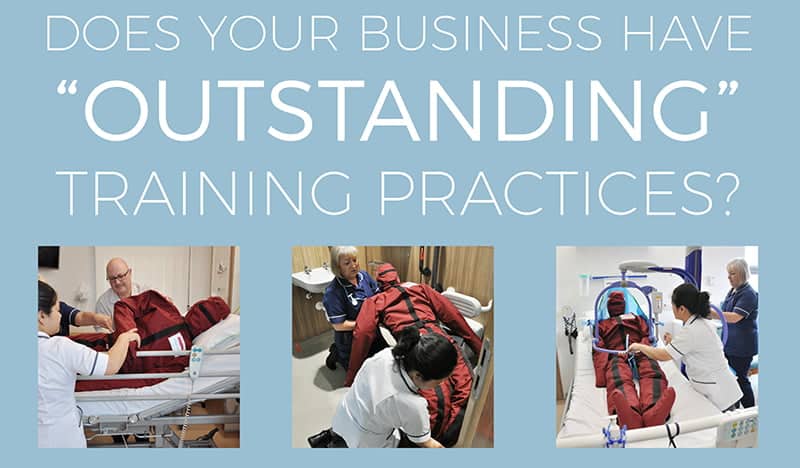If you work in a Care setting, the term “outstanding” is probably one you aspire to have associated with your business. The Care Quality Commission (CQC) assesses all care providers on a scale which reflects the quality of the services they provide and ‘Outstanding’ describes the best of the best.
Of course, you decided on a career in Care because you wanted to make a genuine difference to people’s lives – no one would work in the industry if they didn’t care about people. But in an increasingly competitive industry, the CQC ratings allow you to make your business stand out from the crowd and attract new residents.
“Outstanding” then is a worthy aspiration and Care Homes need to ensure that they are innovative in their approaches to care; not only the care of their residents, but also in the care of their staff.
Training is key
The CQC has released new Key Lines of Enquiry (KLOEs) and rating characteristics which are effective from Autumn 2017.
Ratings are decided based on 5 main areas which are : Safe, Effective, Caring, Responsive and Well-lead.
We have looked closely at the new guidelines and noted several instances where training can make a real impact; especially within the Safe and Effective KLOEs. We have identified these below in the relevant sections:
What questions does the CQC ask in relation to training within the category SAFE
S3.2 – How is safety promoted in recruitment practices, arrangements to support staff, training arrangements, disciplinary procedures, and ongoing checks?
S3.3 – Do staff receive effective training in safety systems, processes and practices?
Within the context of “S3: How does the service make sure that there are sufficient numbers of suitable staff to support people to stay safe and meet their needs?” the CQC says that in order to achieve ‘outstanding’;
- The service is recognised as having an exceptional and inclusive approach to promoting the safety of its staff, and is seen as a good place to work by staff and external organisations.
- Staff and people help to develop innovative safety training that is inclusive and comprehensive. The impact of this is evaluated and feeds into continuous improvement.
- Staff report that they have been provided with excellent training and ongoing support to support people to stay safe and empower them to take appropriate risks.
- The service deals with issues of poor performance immediately and ensures staff are supported to improve.
What questions does the CQC ask in relation to training within the category EFFECTIVE
E2.3 – Do staff and any volunteers have effective and regular mentorship, support, induction, supervision, appraisal and training?
Within E2, the CQC asks “E2: How does the service make sure that staff have the skills, knowledge and experience to deliver effective care and support?”. In order to achieve Outstanding in this area, the CQC states:
- Staff training is developed and delivered around individual needs. People, their families and other carers are involved in planning and delivering this training.
- Training is tailored to the individual needs and learning styles of staff. There is a proactive support and appraisal system for staff, which recognises that continuing development of skills, competence and knowledge is integral to ensuring high-quality care and support.
Clearly, these points highlight how important ongoing staff support and training is, and how having effective training programmes in place can significantly affect your business’ CQC rating.
Empowering staff to perform at their best
As part of your staff training, and particularly for new staff, you should make sure that regular safe lifting and handling training forms part of your programme.
You are no doubt already aware that social care workers are amongst the highest risk group when it comes to injury through lifting and handling. Effective training can help to prevent staff injury.
Don’t be a dummy about training!
When it comes to lifting and/or handling training, using a ‘volunteer’ is not a good idea!
Not only is it undignified for the volunteer, and preventing them from participating in training themselves, but they are also likely to ‘help’ those doing the lifting. It’s natural instinct to protect ourselves, so although they are supposed to be representing an unconscious person, they will brace their heads and neck for example. Another serious problem is the risk of injury to the volunteer – accidents happen and if someone is lifted badly in training the consequences could be severe.
Although lifting equipment should always be used where possible, occasionally it may be necessary to move someone when there is no lifting equipment available, or if someone has fallen in a confined space. Therefore, by teaching your staff safe lifting/moving techniques, you can ensure the safety of both the victim and your team!
Training manikins have been around for a long time and are becoming increasingly popular in health and safety focused care homes.
Our Training Manikins come in a range of sizes and weights – ideal for practising safe handling techniques. Patient Handling manikins are ideal dummies for practising safe lifting and handling techniques. They come in a range of weights and can be used for early mobilisation and emergency evacuation drills. They are also useful for teaching new staff how to safely use lifting/transfer equipment.
Another popular manikin in the health care sector is our Bariatric model. Obesity is a growing problem in the UK and our range comes in 90, 180 and even 260kgs! The 90kg manikins is the ideal choice where you require the bulk of a bariatric, without an excessive amount of weight. We can also provide a water-fillable bariatric suit which allows you to transform a duty range manikin into a bariatric manikin by adding water!
Talk to the experts
The team at Ruth Lee have more than 60 years’ experience and can advise you on the best manikin for your training. For advice, or to book a FREE demonstration (UK only), please call us on 01490 413 282 or email mail@ruthlee.co.uk
